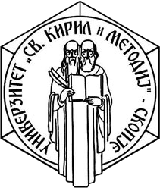Computer Science (4+1)
1. General Information
Postgraduate studies in computer science strive for top European education and training of staff, who after graduation will be able to meet the needs of both commercial companies in the information industry, as well as top scientific research institutions in the country and abroad. .
- Name of the proposer: University "Ss. Cyril and Methodius University in Skopje, Faculty of Information Sciences and Computer Engineering - FINKI
- Name of the study program: Academic second cycle studies in Computer Science
- Scientific-research area: natural-mathematical
- Field: Informatics
- Area: Information Systems and Programming, Computing Integrated Methods and Applications, Algorithms, Optimization, Simulation, Software Development and Databases.
- The value of postgraduate studies is 60 ECTS or 120 ECTS credits.
- Study time: 2 or 4 semesters .
- One academic year consists of two semesters lasting 30 weeks (1 semester = 15 weeks).
- The first semester consists of subjects, while the second consists of subjects and the final project, ie. master thesis.
- Admission Requirements : Completed undergraduate studies in computer science or computer science with a minimum of 240 credits. For study directions that carry less than 240 credits, exams offered in the introductory layer are added.
- Introductory layer : Students who have earned less than 240 credits during their studies are offered a set of differential introductory courses. After their successful realization, the student acquires the right to continue with the second year of postgraduate studies.
- First semester: 3 Mandatory courses and 2 electives, one of which may be from the University list.
- Second semester: 1 Mandatory course and 1 elective, which can be from the university list (only if in the first semester the courses are selected at the Faculty level) and a final project of 18 ECTS.
- 1 ECTS credit corresponds to 30 hours of total work engagement.
- The number of contact hours is 4.
- The academic title or degree obtained after graduation is
- Master in Information Science and Computer Engineering in the field of Computer Science
2. Studies
Table 3: List of Postgraduate Courses
| РБ | CODE / Subject | Semester | M / E | ECTS |
| 1 | KN-Z-01 Advanced algorithms | IX | M | 6 |
| 2 | KN-Z-02 Optimization methods | IX | M | 6 |
| 3 | KN-Z-03 Formal methods | IX | M | 6 |
| 4 | Elective | IX | E | 6 |
| 5 | Elective | IX | E | 6 |
| 6 | KN-Z-04 Research methods and writing techniques | X | M | 6 |
| 7 | Elective | X | E | 6 |
| 8 | Master Thesis | X | M | 18 |
At least one elective should be chosen from the offered electives in Table 4. At most one of the electives can be chosen from the University list of master's degree programs. A maximum of two elective courses can be selected from the courses offered at the other postgraduate studies at the Faculty of Information Sciences and Computer Engineering.
Table 4: Electives
| РБ | New Code / Subject | Semester | ECTS | |
| 1 | KN-I-01 Modern simulations and modeling | IX | 6 | |
| 2 | KN-I-02 Big Data Concepts and Applications | IX | 6 | |
| 3 | KN-I-03 Database Performance, Reliability and Security | IX | 6 | |
| 4 | KN-I-04 Complexity Theory and Coding | IX | 6 | |
| 5 | KN-I-05 Text-data processing | IX | 6 | |
| 6 | KN-I-06 Modern trends in parallel processing | IX | 6 | |
| 7 | КН-E-07 | |||
| 8 | КН-E-08 Big Data Modeling and Management | X | 6 | |
| 9 | KN-I-09 Bayesian Data Analysis | X | 6 | |
| 10 | KN-I-10 Business process mining | X | 6 | |
| 11 | IS-Z-02 Advanced artificial intelligence and machine learning | IX | 6 | |
| 12 | СE-E-01 Time series analysis and forecasting | IX | 6 | |
| 13 | BK-I-07 Mathematical Logic for Computer Science | IX | 6 | |
| 14 | IT-I-05 Data visualization | IX | 6 | |
| 15 | IS-I-16 Computational Game Theory | X | 6 | |
| 16 | BC-I-08 Advanced Algebraic Structures | X | 6 | |
The student can choose a subject from the list of offered elective courses from all study programs of the second cycle of studies. The list of offered electives can be found on this link .

